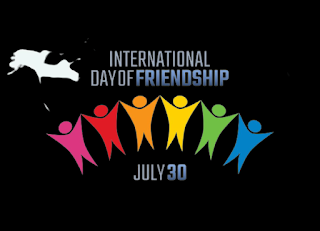The International Day of Friendship: Celebrating Bonds that Unite Humanity
Introduction:
Friendship, an essence that transcends borders and cultures, is a cherished aspect of human life that brings people together in an emotional bond of trust, love, and understanding. Recognizing the importance of friendship in promoting peace, harmony, and solidarity, the United Nations designated July 30th as the International Day of Friendship. This annual observance serves as a reminder of the critical role friendship plays in building bridges between individuals and communities worldwide. In this article, we delve into the significance of this special day and explore how friendships can contribute to fostering a more inclusive and compassionate global society.
The Origins of International Day of Friendship:
The idea of celebrating an International Day of Friendship was first proposed in 1958 by Dr. Ramón Artemio Bracho, a Paraguayan doctor and World Crusade of Friendship activist. Dr. Bracho's vision was to foster goodwill and understanding among nations by promoting friendship across cultures and promoting a sense of camaraderie among people of different backgrounds. Although it took several decades for the proposal to gain traction, the United Nations formally recognized the International Day of Friendship in 2011.
The Significance of Friendship in a Global Context:
Friendship serves as a powerful force that transcends geographical, cultural, and political boundaries. It plays a vital role in promoting peace and stability among nations by encouraging dialogue, mutual respect, and cooperation. In an increasingly interconnected world, where conflicts and misunderstandings can arise easily, friendship acts as a buffer, creating opportunities for open communication and diplomacy.
Moreover, genuine friendships between individuals from diverse backgrounds contribute to breaking down stereotypes and dispelling prejudices. By fostering understanding and empathy, friendships enable people to appreciate and celebrate the richness of different cultures, traditions, and beliefs. In this way, they pave the way for building a more inclusive and harmonious global community.
The Impact of Friendship on Mental Health and Well-being:
Friendship also plays a crucial role in promoting mental health and well-being on a personal level. Close friendships provide emotional support during challenging times, reduce feelings of isolation, and increase overall happiness and life satisfaction. Studies have shown that individuals with strong social connections are more resilient to stress and have a reduced risk of mental health issues such as depression and anxiety.
In the digital age, maintaining and cultivating friendships has become easier through social media and online platforms. However, it is essential to emphasize the value of meaningful, face-to-face interactions to build genuine and lasting friendships. Taking the time to nurture relationships and be present for friends during both good and difficult times can lead to more fulfilling and meaningful connections.
Promoting Friendship to Address Global Challenges:
The world faces a myriad of complex challenges, from environmental crises to economic inequality and global health threats. While friendship may not be a panacea for these issues, it can play a significant role in finding collective solutions. Friendships create a sense of shared responsibility, encouraging individuals and communities to work together towards common goals. By promoting collaboration and cooperation, friendships can contribute to tackling global issues and building a more sustainable future for all.
Celebrating the International Day of Friendship:
The International Day of Friendship is an opportunity for individuals, organizations, and governments to promote the importance of friendship and its role in creating a more compassionate world. It is a time to celebrate existing friendships, reach out to old friends, and extend a hand of friendship to new acquaintances.
Various activities and events can be organized to mark this special day. Community gatherings, cultural exchanges, and intercultural dialogues can help bring people from different backgrounds together. Additionally, social media campaigns, using hashtags such as #FriendshipDay or #InternationalFriendshipDay, can spread messages of friendship and encourage people to share stories of meaningful friendships in their lives.
Conclusion:
The International Day of Friendship serves as a global reminder of the power and significance of friendship in uniting humanity. By fostering understanding, compassion, and cooperation, friendships can bridge divides and contribute to a more peaceful and inclusive world. As individuals, let us cherish and nurture our friendships, and as a global community, let us recognize the potential of friendship in addressing global challenges and promoting harmony among nations.





Post a Comment